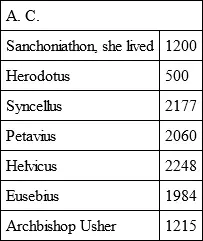Charles Bucke - Ruins of Ancient Cities (Vol. 2 of 2)
Здесь есть возможность читать онлайн «Charles Bucke - Ruins of Ancient Cities (Vol. 2 of 2)» — ознакомительный отрывок электронной книги совершенно бесплатно, а после прочтения отрывка купить полную версию. В некоторых случаях можно слушать аудио, скачать через торрент в формате fb2 и присутствует краткое содержание. Жанр: foreign_antique, foreign_prose, на английском языке. Описание произведения, (предисловие) а так же отзывы посетителей доступны на портале библиотеки ЛибКат.
- Название:Ruins of Ancient Cities (Vol. 2 of 2)
- Автор:
- Жанр:
- Год:неизвестен
- ISBN:нет данных
- Рейтинг книги:4 / 5. Голосов: 1
-
Избранное:Добавить в избранное
- Отзывы:
-
Ваша оценка:
- 80
- 1
- 2
- 3
- 4
- 5
Ruins of Ancient Cities (Vol. 2 of 2): краткое содержание, описание и аннотация
Предлагаем к чтению аннотацию, описание, краткое содержание или предисловие (зависит от того, что написал сам автор книги «Ruins of Ancient Cities (Vol. 2 of 2)»). Если вы не нашли необходимую информацию о книге — напишите в комментариях, мы постараемся отыскать её.
Ruins of Ancient Cities (Vol. 2 of 2) — читать онлайн ознакомительный отрывок
Ниже представлен текст книги, разбитый по страницам. Система сохранения места последней прочитанной страницы, позволяет с удобством читать онлайн бесплатно книгу «Ruins of Ancient Cities (Vol. 2 of 2)», без необходимости каждый раз заново искать на чём Вы остановились. Поставьте закладку, и сможете в любой момент перейти на страницу, на которой закончили чтение.
Интервал:
Закладка:
The next king of Assyria was Ninus, the son of Nimrod. This prince prepared a large army, and in the course of seventeen years conquered a vast extent of country; extending to Egypt on one side, and to India and Bactriana on the other. On his return he resolved on building the largest and noblest city in the world; so extensive and magnificent, as to leave it in the power of none, that should come after him, to build such another. It is probable, however, that Nimrod laid the foundations of this city, and that Ninus completed it: for the ancient writers often gave the name of founder to persons, who were only entitled to the appellation of restorer or improver.
This city was called Nineveh. Its form and extent are thus related by Diodorus, who states that he took his account from Ctesias the Gnidian: – “It was of a long form; for on both sides it ran out about twenty-three miles. The two lesser angles, however, were only ninety furlongs a-piece; so that the circumference of the whole was about seventy-four miles. The walls were one hundred feet in height; and so broad, that three chariots might be driven together upon it abreast; and on these walls were fifteen hundred turrets, each of which was two hundred feet high.”
When the improver had finished the city, he appointed it to be inhabited by the richest Assyrians; but gave leave, at the same time, to people of other nations (as many as would) to dwell there; and, moreover, allowed to the citizens at large a considerable territory next adjoining them.
Having finished the city, Ninus marched into Bactria; his army consisting of one million seven hundred thousand men, two hundred thousand horse, and sixteen thousand chariots armed with scythes. This number is, doubtless, greatly exaggerated. With so large a force, he could do no otherwise than conquer a great number of cities. But having, at last, laid siege to Bactria, the capital of the country, it is said that he would probably have failed in his enterprise against that city, had he not been assisted by the counsel of Semiramis, wife to one of his officers, who directed him in what manner to attack the citadel. By her means he entered the city, and becoming entire master of it, he got possession of an immense treasure. He soon after married Semiramis; her husband having destroyed himself, to prevent the effects of some threats that Ninus had thrown out against him. By Semiramis, Ninus had one son, whom he named Ninyas; and dying not long after, Semiramis became queen: who, to honour his memory, erected a magnificent monument, which is said to have remained a long time after the destruction of the city.
The history of this queen is so well known, 22 22 See Herod. i. c. 184; Diodor. Sic. ii.; Pompon. Mela, i. c. 3; Justin. i. c. 1; Val. Max. ix. c. 3.
that we shall not enlarge upon it; we having already done so in our account of Babylon; for she was one of the enlargers of that mighty city.
There is a very great difference of opinion, in regard to the time in which Semiramis lived. According to

Alexander’s opinion of this celebrated woman may be gathered from the following passage of his speech to his army: – “You wish to enjoy me long; and even, if it were possible, for ever; but, as to myself, I compute the length of my existence, not by years, but by glory. I might have confined my ambition within the narrow limits of Macedonia; and, contented with the kingdom my ancestors left me, have waited, in the midst of pleasures and indolence, an inglorious old age. I own that if my victories, not my years, are computed, I shall seem to have lived long; but can you imagine, that after having made Europe and Asia but one empire, after having conquered the two noblest parts of the world, in the tenth year of my reign and the thirtieth of my age, that it will become me to stop in the midst of so exalted a career, and discontinue the pursuit of glory to which I have entirely devoted myself? Know, that this glory ennobles all things, and gives a true and solid grandeur to whatever appears insignificant. In what place soever I may fight, I shall fancy myself upon the stage of the world, and in presence of all mankind. I confess that I have achieved mighty things hitherto; but the country we are now in reproaches me that a woman has done still greater. It is Semiramis I mean. How many nations did she conquer! How many cities were built by her! What magnificent and stupendous works did she finish! How shameful is it, that I should not yet have attained to so high a pitch of glory! Do but second my ardour, and I will soon surpass her. Defend me only from secret cabals and domestic treasons, by which most princes lose their lives; I take the rest upon myself, and will be answerable to you for all the events of the war.”
“This speech,” says Rollin, “gives us a perfect idea of Alexander’s character. He had no notion of true glory. He did not know either the principle, the rule, or end of it. He certainly placed it where it was not. He was strongly prejudiced in vulgar error, and cherished it. He fancied himself born merely for glory; and that none could be acquired but by unbounded, unjust, and irregular conduct. In his impetuous sallies after a mistaken glory, he followed neither reason, virtue, nor humanity; and as if his ambitious caprice ought to have been a rule and standard to all other men, he was surprised that neither his officers nor soldiers would enter into his views, and that they lent themselves very unwillingly to support his ridiculous enterprises.” These remarks are well worthy the distinguished historian who makes them.
Semiramis was succeeded by her son Ninyas; a weak and effeminate prince, who shut himself up in the city, and, seldom engaging in affairs, naturally became an object of contempt to all the inhabitants. His successors are said to have followed his example; and some of them even went beyond him in luxury and indolence. Of their history no trace remains.
At length we come to Pull, supposed to be the father of Sardanapalus; in whose reign Jonah is believed to have lived. “The word of the Lord,” says the Hebrew scripture, “came unto Jonah, the son of Amittai, saying, Arise, go to Nineveh, that great city, and cry against it; for their wickedness is come up before me.” Jonah, instead of acting as he was commanded, went to Joppa, and thence to Tarshish. He was overtaken by a storm, swallowed by a whale, and thrown up again. Being commanded again, he arose and went to Nineveh, “ an exceedingly great city of three days’ journey ;” where, having warned the inhabitants, that in forty days their city should be overthrown, the people put on sackcloth, “from the greatest of them even to the least.” The king sat in ashes, and proclaimed a fast. “Let neither man nor beast,” said the edict, “herd nor flock, taste any thing; let them not feed, nor drink water; but let man and beast be covered with sackcloth; and cry mightily unto God; yea, let them turn every one from his evil way, and from the violence that is in their hands. Who can tell if God will turn and repent, and turn away from his fierce anger, that we perish not?”
On the king’s issuing this edict, the people did as they were commanded, and the ruin was delayed. On finding this, the prophet acted in a very unworthy manner. To have failed as a prophet gave him great concern; insomuch, that he desired death. “Take, I beseech thee, O Lord, my life from me; for it is better for me to die than to live.” “Shall I not spare Nineveh,” answered the Lord, “that great city, wherein are more than six-score thousand persons, that cannot discern between their right hand and their left hand; and also much cattle?”
Читать дальшеИнтервал:
Закладка:
Похожие книги на «Ruins of Ancient Cities (Vol. 2 of 2)»
Представляем Вашему вниманию похожие книги на «Ruins of Ancient Cities (Vol. 2 of 2)» списком для выбора. Мы отобрали схожую по названию и смыслу литературу в надежде предоставить читателям больше вариантов отыскать новые, интересные, ещё непрочитанные произведения.
Обсуждение, отзывы о книге «Ruins of Ancient Cities (Vol. 2 of 2)» и просто собственные мнения читателей. Оставьте ваши комментарии, напишите, что Вы думаете о произведении, его смысле или главных героях. Укажите что конкретно понравилось, а что нет, и почему Вы так считаете.












